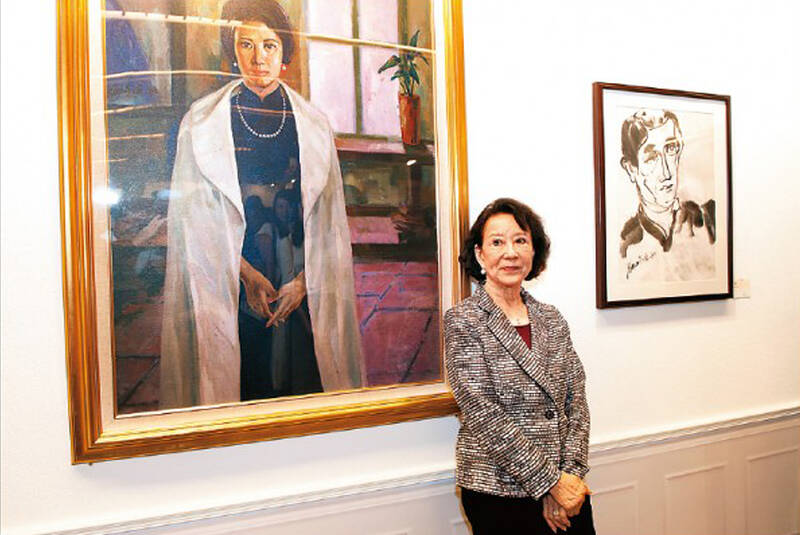Taiwanese author, academic and translator Lin Wen-yue (林文月) passed away in the US on Friday morning, the Taipei Chinese Center of PEN International said in a statement on Facebook yesterday.
She was 89.
Lin, who was born on Sept. 5, 1933, in Shanghai and moved to Taiwan when she was about 14, dedicated her life to literary research, translation, writing and art, the center said.

Photo courtesy of Trend Education Foundation
She was an expert in Chinese “six dynasties” literature and Sino-Japanese comparative literary research, said the center, of which Lin was a member.
She translated important works of Japanese literature, including The Tale of Genji (circa 11th century), often described as the world’s first novel, as well as The Pillow Book of Sei Shonagon (circa 11th century).
Her writing is considered a model of contemporary Chinese prose, while her narratives won several awards and were selected as teaching materials in text books for junior and senior high schools, the statement said.
For example, A Year in Kyoto (京都一年) and Raining in Florence (翡冷翠在下雨), are part of school curricula, it said.
“Her writing is clear and smooth, and her style rich,” author Pai Hsien-yung (白先勇) once said.
Yang Tsung-han (楊宗翰), an assistant professor in the Department of Chinese Literature at Tamkang University and the center’s secretary-general, said that one of Lin’s prose works, A Lifetime in Chinese Literature, inspired “everyone who studies Chinese literature.”
While some people would call Chinese literature a useless subject, Lin inspired those who study in the field to find their own place in the world, Yang said.
Lin earned bachelor’s and master’s degrees in Chinese literature at National Taiwan University (NTU), and started her teaching career at NTU while studying for her master’s in 1958.
In 1969, she studied at Kyoto University’s Institute for Research in Humanities as a foreign researcher for a year.
Lin retired from NTU in 1993 and moved to the US. She continued to work in the field of literature, translation, writing and art.

Taiwan has received more than US$70 million in royalties as of the end of last year from developing the F-16V jet as countries worldwide purchase or upgrade to this popular model, government and military officials said on Saturday. Taiwan funded the development of the F-16V jet and ended up the sole investor as other countries withdrew from the program. Now the F-16V is increasingly popular and countries must pay Taiwan a percentage in royalties when they purchase new F-16V aircraft or upgrade older F-16 models. The next five years are expected to be the peak for these royalties, with Taiwan potentially earning

STAY IN YOUR LANE: As the US and Israel attack Iran, the ministry has warned China not to overstep by including Taiwanese citizens in its evacuation orders The Ministry of Foreign Affairs (MOFA) yesterday rebuked a statement by China’s embassy in Israel that it would evacuate Taiwanese holders of Chinese travel documents from Israel amid the latter’s escalating conflict with Iran. Tensions have risen across the Middle East in the wake of US and Israeli airstrikes on Iran beginning Saturday. China subsequently issued an evacuation notice for its citizens. In a news release, the Chinese embassy in Israel said holders of “Taiwan compatriot permits (台胞證)” issued to Taiwanese nationals by Chinese authorities for travel to China — could register for evacuation to Egypt. In Taipei, the ministry yesterday said Taiwan

‘LIKE-MINDED PARTNER’: Tako van Popta said it would be inappropriate to delay signing the deal with Taiwan because of China, adding he would promote the issue Canadian senators have stressed Taiwan’s importance for international trade and expressed enthusiasm for ensuring the Taiwan-Canada trade cooperation framework agreement is implemented this year. Representative to Canada Harry Tseng (曾厚仁) in an interview with the Central News Agency (CNA) said he was increasingly uneasy about Ottawa’s delays in signing the agreement, especially as Ottawa has warmed toward Beijing. There are “no negotiations left. Not only [is it] initialed, we have three versions of the text ready: English, French and Mandarin,” Tseng said. “That tells you how close we are to the final signature.” Tseng said that he hoped Canadian Prime Minister Mark Carney

POSITIVE DEVELOPMENT: Japan and the US are expected to hold in-depth discussions on Taiwan-related issues during the meeting next month, Japanese sources said The holding of a Japan-US leaders’ meeting ahead of US President Donald Trump’s visit to China is positive news for Taiwan, former Japan-Taiwan Exchange Association representative Hiroyasu Izumi said yesterday. After the Liberal Democratic Party’s landslide victory in Japan’s House of Representatives election, Japanese Prime Minister Sanae Takaichi is scheduled to visit the US next month, where she is to meet with Trump ahead of the US president’s planned visit to China from March 31 to April 2 for a meeting with Chinese President Xi Jinping (習近平). Japan and the US are expected to hold in-depth discussions on Taiwan-related issues during the